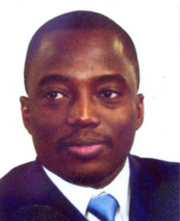Joseph Kabange Kabila, 35, president of the current transitional government in the DRC. |
NAIROBI, 24 Aug 2006 (IRIN) - Joseph Kabange Kabila, 35, is president of the current transitional government in the Democratic Republic of Congo (DRC) and stood as an independent candidate in national elections, held on 30 July.
He won 45 percent, according to preliminary results issued by the Independent Electoral Commission. A presidential candidate requires 50 percent plus one vote to avoid a run-off. A second round will be held on 29 October between him and Vice-President Jean Pierre Bemba who came in second place with around 20 percent of the vote.
Kabila did poorly in the west of the country and won less than 20 percent of the vote in the capital, Kinshasa, against Bemba's 50 percent. Kabila's support came mostly from the east of the country.
He was born on 4 June 1971 in Hewa Bora II, in the eastern province of South Kivu. He received his early education in the public school system in Fizi, South Kivu. He completed elementary school in Dar es Salaam, Tanzania, and secondary school in Mbeya, also in Tanzania. Today, he holds a bachelor's degree in international studies and diplomacy from Washington International University, which describes itself as a pioneer in distance education. He was married on 17 June 2006 to Olive Lembe Disita, with whom he has a six-year-old girl.
Although he leads the Parti du peuple pour la reconstruction et la démocratie (People's Party for Reconstruction and Development - PPRD), Kabila said people outside his party had appealed to him to run as an independent. Kabila's opponents had objected to his candidacy, saying under the electoral law his military status as a serving army officer disqualified him from running for the presidency. However, he resigned his commission on 15 March so the electoral commission cleared him to contest the polls.
He became president of the republic on 26 January 2001 following the assassination of his father, Laurent-Desire Kabila. His opponents claim he is not the biological son of the late president.
Soon after assuming power, Joseph Kabila began negotiations with the country's different rebel factions in an attempt to unify the nation. At the end of these talks, he retained leadership of the country, as president of the newly-created transitional government, which is due to end its term on 30 June.
Before being thrust onto the political centre stage, Kabila was a guerrilla commander in Laurent-Desire Kabila's Alliance des forces démocratiques pour la libération du Congo-Zaire (the Alliance of Democratic Forces for the Liberation of Congo-Zaire, AFDL) movement, which he joined in 1996. The younger Kabila was made the movement's operations commander in what was known as the First Congo War.
Following the AFDL's victory over President Mobutu Sese Seko, the younger Kabila went for further military training at the National Defence University in the People's Republic of China. On his return, he was promoted to major-general and in 1998 appointed deputy chairman of the joint chiefs of staff of the armed forces.
Related articles
- • Felix Tshisekedi Sworn In as DR Congo President (January 24, 2019)
- • Constitutional Court Declares Tshisekedi Winner of Presidential Election (January 19, 2019)
- • Felix Tshisekedi Vows to Be the President of All Congolese (January 10, 2019)
- • Felix Tshisekedi Elected DR Congo President (January 10, 2019)
- • DR Congo Delays Results of December Election (January 6, 2019)
- • Botswana Urges Joseph Kabila to Step Down (February 26, 2018)
- • No elections in DR Congo in December without electronic voting machines: INEC (February 13, 2018)
- • US Warns DR Congo Against Electronic Voting for Delayed Election (February 12, 2018)
- • Felix Tshisekedi accuses INEC of illegally prolonging Kabila's mandate (October 24, 2017)
- • DRC Seeks Arrest of Presidential Candidate Moise Katumbi (May 19, 2016)
- • Papa Wemba Is Buried in Kinshasa (May 4, 2016)
- • Papa Wemba Awarded Highest National Honor as Thousands Pay Tribute (May 2, 2016)
- • Rights Groups: DR Congo Must Free Pro-democracy Activists (April 13, 2015)
- • Police Open Fire on Crowd Protesting Election Law Change (January 19, 2015)
- • Etienne Tshisekedi Evacuated to Belgium for Medical Treatment (August 16, 2014)
- • Kerry Calls on Kabila to Honor Constitution (May 4, 2014)
- • Kerry in DR Congo for Security Talks (May 3, 2014)
- • DR Congo Takes Chairmanship of COMESA at Summit in Kinshasa (February 26, 2014)
- • DR Congo Honors Nelson Mandela, Hero and Model for Humanity (December 6, 2013)
- • Kabila Congratulates Congo Army for Defeating M23 Rebels (October 30, 2013)
- • DR Congo Eases Process for Starting a New Business (June 3, 2013)
- • Regional Leaders Sign DR Congo Peace Deal (February 24, 2013)
- • The M23 Rebels Want to Overthrow Kabila? Nonsense (November 28, 2012)
- • Protests Against M23 Rebels, Government and UN Spread (November 22, 2012)
- • Thousands Protest M23 Capture of Goma, Turn on Government and UN (November 21, 2012)
- • DR Congo Officials Vow to Defend Goma Against M23 Rebels (November 19, 2012)
- • At high-level meeting, Ban urges political solution to crisis in eastern DR Congo (September 27, 2012)
- • US Cuts Military Aid to Rwanda Over Support to Rebels in DR Congo (July 21, 2012)
- • DR Congo, Rwanda Sign Pact to Fight Rebels in Eastern Congo (July 15, 2012)
- • Police Investigate Former Prime Minister for Corruption (May 14, 2012)








